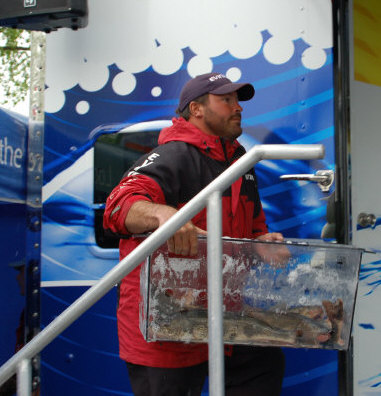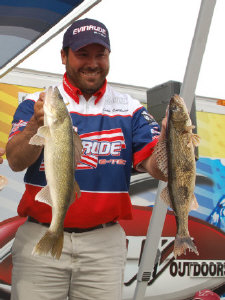Scott Fairbairn: From the Boat to Grad School
Category: npaa
Oct 21st, 2009 by OutdoorsFIRST
Modified Oct 21st, 2009 at 12:00 AM
Walleye First Feature Story
Scott Fairbairn: From the Boat to Grad School
October 2009
By Jim Kalkofen
“I got into tournament fishing for a good reason and I’m leaving the world of competitive fishing for a great reason,” pro angler Scott Fairbairn explained recently. After 17 years on tour, Fairbairn, a top professional angler, has made the transition from the boat to the Carlson School of Business. The 2009 FLW Championship in Bismarck was his final tournament.
During his career, he set lofty goals, and accomplished most of them. He won the PWT Angler of the Year title, won several tournaments, made a living doing what he loved, made all but four PWT, NAWA, MWC and FLW Championships, and just missed winning a Championship (he was second three times). Fairbairn also worked within the sport and was instrumental in many key rules changes. His “points” scoring idea was implemented by the PWT, and is widely imitated. He served on the NAWA and PWT Advisory Councils and as a NPAA and AIM board member.
 |
|
|
|
The three most important lessons learned were respect, hard work and caution. “In tournament fishing, contestants make decisions what to do regarding other anglers. Over hundreds of events, I hope the other competitors have the same respect for me that I tried to earn from them by my actions on the water.” Interactions with other competitors do not go unnoticed, he said, and an image once destroyed affects credibility with anglers and throughout the tackle and marine industry. “A career in pro fishing demands the principle of respect,” he emphasized.
Hard work proved to be a guiding light. “I never got paid to go fishing. I had to find ways to promote, sell and be creative to develop real value for my sponsors. There is no manual, just hard work.” The demands of making a living as a pro required the sacrifice of being away from home 150 to 180 days each year. “You can’t do pro fishing part-time. Perhaps the fact my kids are five and nine is also part of the transition, because it’s fabulous being with them.”
He started with a 16-foot boat and a 25-hp tiller was OK on that first Big Stone Lake tournament in western Minnesota. By the next tournament a month later, he had a bigger boat. He said, “The amazing part of tournament fishing is what I learned. It was every day, every tournament – constantly learning. I thought I was a good Minnesota angler, but realized I was not nearly good enough for all the other waters.” Fairbairn fished during the tremendous “knowledge-curve” of the early 1990’s, which was the key time-period for anglers learning about walleyes. “I remained at weigh-ins until I had answers to my questions. I wanted to know exactly how the top place anglers caught their fish,” he said.
 |
|
|
|
“Caution” is number three on Fairbairn’s lessons learned list. “Making a living from something you’re passionate about can be very challenging,” he cautioned. Loving something and trying to make a living from it can affect an individual’s outlook. As the seasons wore on, he noticed his passion for fishing appeared to be waning. He said, “I had fished most tournament-capable waters many times, and repetition had dulled the passion of competitive fishing.”
After college graduation, he jumped into competitive fishing at the time where the learning curve was exploding with new tactics, techniques, boats, outboards, trolling motors, rods, reels, lures, line and electronics, due primarily to tournament innovations. “This was a great time to be a pro, and I loved it.” Reflecting upon his career, he said, “I need new challenges instead of racing from tournament to tournament.”
Fairbairn realized that the most enjoyable part of being a pro was the business side of fishing, especially during the last half of his career. “I have worked with 30 different companies from start-up to major brands. I gained a tremendous depth of knowledge and always asked why,” he said. Fairbairn earned 80 percent of his income from the sales and marketing efforts he did for these companies, representing them at the retail level, at shows, at sales training seminars, in the media and as a spokesman. Only 20 percent of his income came from showing up to fish tournaments. “Most guys don’t understand where sponsorship dollars come from,” he said.
His North Star “ice boat” was the first wrapped boat in the entire fishing industry, appearing on TV, in magazines, in newspapers, on posters and at grocery store promotions. The “ice boat” campaign started in 1995 and propelled (and paid) him further along his career path. Winning the PWT Angler of the Year title in 1998 opened doors in the sponsorship-world. These became long-term promotional and marketing relationships, and he will continue working with some of them. He will also conduct educational fishing seminars.
“I always wanted to know the answers to my ‘why’ questions,” he said. “Already, I’ve got some answers.” His new mission is to gain a breadth of knowledge to go with the depth of knowledge gained as a touring pro angler. Fairbairn said he doesn’t know where an MBA degree with an emphasis on brand management will take him. He will consider working within the marine or tackle industries if an opportunity arises. “I’m open to anything,” he said of his new business-career venture, which was the same philosophy and approach to a very successful run in the competitive walleye fishing world.
Pat Neu, Pro Angler: “He’s a class act and brought a strong sense of business to the tournament game. He had all the skills on the water, but understood how to benefit the companies that sponsored him. It was probably a difficult decision to leave the sport and adjust his career path. Scott is going to be missed on tour.”
Sonny Reynolds, FLW Tournament Director: “I enjoyed having him fish with us. He made things better due to his suggestions. He was a thinker and very direct with ideas and solutions for improvement. He was consistent on and off the water.”
Krista Heidgerken, Evinrude Outboards Communications Coordinator: “He has been the Number One Evinrude pro in professionalism. For him, this is absolutely the right move. I feel he will surface within the industry after graduation.”
Cody Roswick, NPAA Executive Director: “Right now, this was definitely a smart decision for him and his family. Many pros are making sure their finances are in order, even if it means taking time off before they continue tournament fishing. If he ever decides to jump back in, I feel he will be as tough as ever. He did a lot of good for the NPAA and took care of business.”
Gary Parsons, Pro Angler, TV Host, National Fresh Water Hall of Fame Member: “Scott’s fishing record speaks for itself. He’s a stellar angler. He’s always been consistent, because he’s a master of all techniques and excellent on rivers and with live bait. I admire his skills. He knew that he had to work with and help his sponsors sell product in order for both to survive. I commend him for looking at his future. With his MBA, he will be able to benefit many companies or even start his own company. His experience on the tours will prove valuable in school. He exudes common sense and he has a bright future.”